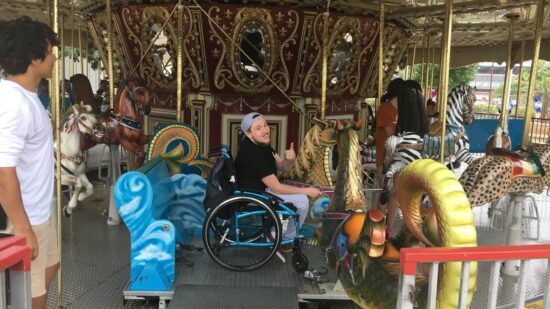By Charlotte Titus, U.S. Department of State, and Meghan Simpson, World Learning, with translation provided by Sergey Chornomaz at U.S. Embassy Kiev

Sergey at Morgan’s Wonderland in San Antonio in 2017. Credit: Natalya Kononenko
Editor’s note: Sergey Letuchyi is a 2017 alumnus of the U.S. Department of State International Visitor Leadership Program (IVLP) from Ukraine. He hosted a virtual concert on May 6, 2020 to build global unity and reconnect with his IVLP organizers: U.S. Embassy Kiev; World Learning, a National Program Agency; and three Community-Based Members: the San Antonio Council for International Visitors, WorldDenver, and WorldOregon. This interview was conducted by email and has been edited for content and clarity.
Q.: Among your many talents, you are a member of a musical duo called “Flying Swan.” Tell us about this group and your music.
A.: My bandmate Aleksey and I started “Flying Swan” in 2010. The name comes from our surnames: Sergey LETUCHYI (meaning “flying”) and Aleksey LEBED (meaning “swan”). Aleksey does beatboxing — reproducing the sounds of a full band through vocal percussion. I write songs, play guitar, and sing. Aleksey and I are from Starobielsk, Luhansk in eastern Ukraine, a region that is currently a war zone. Our mission is to maximize support for Ukrainian unity and Ukrainian culture through our music.
I’ve been in a wheelchair since I was 17, but this doesn’t stop me from building my musical career. On the contrary, it encourages me to be an example, to show others that life is unlimited, and people need to fight for their dreams.
Q.: You participated in a single-country IVLP for Ukraine in 2017, can you share some particularly memorable moments during this program?
A.: From May 8 to 26, four other Ukrainians and I took part in the IVLP, “Integration and Advocacy for Socially Vulnerable Populations.” We went to Washington, DC; Portland, OR; Denver, CO; and San Antonio, TX. We visited organizations and institutions that had a tremendous experience in interacting with vulnerable social groups. We had a chance to discuss infrastructure and anti-discrimination policy, and even talked about medical and social needs of refugees and immigrants.
We also visited a unique library where they create audiobooks and make special balls for people with visual impairments. In Colorado, we met with members of the Ukrainian diaspora, with whom I still keep in touch. In San Antonio, we visited actress Eva Longoria’s organization, Eva’s Heroes.
Q.: What have you been up to since returning home from the United States? How did your participation in the program impact your work or role in your community?
A.: When I returned home, that same month, I met with government officials, various representatives of the city public sector, and businesses, and told them what I saw while in the United States and shared my ideas on improving the city’s infrastructure. I organized an assessment of the city’s architectural accessibility and then presented the assessment at a large-scale press conference for city’s representatives of government, education community, and activists. Following my meetings with representatives of the City Council and Regional Administration, five accessibility ramps were built in Starobielsk.
Q.: You recently held a concert to bring people together during a time of isolation and uncertainty. Why did you decide to do this? Why is keeping the spirit of exchange alive important to you?
A.: The international project #caring_bridge is a creative online collaboration of Ukrainian musicians to strengthen ties between musicians, listeners, and all representatives of the cultural industry.
I teamed up with a drummer and public activist Yuri Berezovsky, also from Starobielsk. We performed my songs and chatted with listeners about how the quarantine is affecting people and the world at large. We and the audience agreed: this is a difficult challenge that has pushed humanity to search for new formats of connection. Luhansk Regional Universal Scientific Library organized the video stream. After being forced to relocate from occupied Luhansk to Starobielsk in 2016, the library restarted from scratch, searching for new premises, gathering a new team, and collecting books. Members of the Ukrainian diaspora whom I met on my IVLP actually contributed to their book collection drive.
